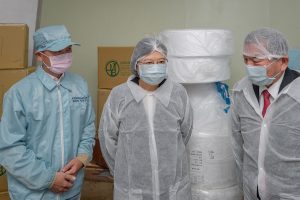Over the last few weeks, the world has observed a grand PR campaign from Beijing, an attempt to shift the global narrative in China’s favor by touting its containment of COVID-19 as the successful outcome of its political model. The outgoing message is that China’s anti-coronavirus campaign “demonstrated the notable advantages of the leadership of the Communist Party of China and the system of socialism with Chinese characteristics,” and that Singapore, Japan, and South Korea “based their responses on the experience and lessons drawn from China’s successful battle with the virus.” The Global Times has quoted Chinese analysts stating that China’s model is the “only proven successful model so far that could be replicated to halt the virus once and for all.”
The other core message within China’s narrative is that “China has acted as a responsible big country” in playing a leadership role to combat the virus based on Xi Jinping’s concept of a “Community of Shared Future for Mankind.” China has backed its narrative by launching a “mask diplomacy” campaign, providing medical masks and ventilators as well as dispatching medical personnel to countries seeking aid.
China’s mouthpiece media went into overdrive in circulating the news of the world’s gratitude toward China, reporting on the Serbian president kissing the Chinese flag and Italians playing the Chinese national anthem (the latter was later debunked by Italian media as “fake news”). The same contents flooded social media through fake accounts praising China’s effort while portraying democratic institutions as weak in coping with the pandemic.
As democracies like the United States and Britain stumbled, the success of China’s draconian containment measures became a testament to the strength of Beijing’s authoritarian system. Democracies like France and Germany started implementing measures that Angela Merkel has described as “infringement on personal freedoms implemented only reluctantly” in the New York Times’ paraphrasing.
Democracies like Taiwan and South Korea, however, served as examples to combat the “China model” rhetoric currently belittling liberal democracies, traditionally represented by Western countries.
Under Tsai Ing-wen, Taiwan has become the bane of Beijing’s current propaganda campaign. The island outperformed China in dealing with the coronavirus without resorting to the strict measures touted by Beijing. Taiwan has had less than 380 confirmed cases and five deaths as of Wednesday — a remarkable feat considering Taiwan’s proximity to mainland China.
Taiwan has launched its own “mask diplomacy,” donating 10 million masks to its partners under the slogan: “Taiwan can help, and Taiwan is helping.” European Union President Ursula von der Leyen tweeted “The European Union thanks Taiwan for its donation of 5.6 million masks to help fight the #coronavirus” in an unusual show of public support for Taiwan from the EU. Taiwan has also forged medical partnerships with countries such as the Czech Republic.
Much to Beijing’s chagrin, praise of Taiwan’s success has provided the island with much-needed global exposure, granting Tsai a success in her strategy to utilize Taiwan’s identity as a democracy to garner international support. The United States supported Taiwan in a State Department statement saying that, in combating COVID-19, “countries around the world can benefit from better understanding the ‘Taiwan Model,’ as well as the generous contributions and impressive expertise Taiwan — a vibrant democracy and force for good — brings to the global community.” Support for Taiwan’s appeal to join the WHO has also increased. Taiwan’s charm offensive has undercut Beijing’s current effort to constrict Tsai’s approval rating and convince her Democratic Progressive Party (DPP) to abandon its “independence agenda.” More importantly, Taiwan has countered the idea that China’s anti-coronavirus model is the prime model to follow by providing a more attractive alternative to democracies.
Beijing’s Taiwan Affairs Office has decried Taiwan’s “mask diplomacy” as “taking the wrong path of ‘worshipping everything foreign’ and engaging in a confrontation with the Motherland.” Beijing has also criticized Taiwan’s cooperation with the United States as the DPP’s “despicable move and political plot to use the COVID-19 pandemic to achieve independence.” Foreign Ministry spokesperson Hua Chunying commented on Taiwan’s mask donation to the United States that “it seems that the U.S. has really let its standard fall, as 2 million masks are enough to make Taiwan a model of democracy and a ‘true friend.’”
Ironically, Beijing’s maladroit diplomacy and propaganda are contributing to Taiwan’s success in undercutting the mainland’s PR offensive. Other than providing defective supplies, exporting medical supplies rather than donating them as claimed, and providing aid according to how “potential recipients have treated China in the past,” the combative speech of Chinese diplomats and its misinformation campaign to deflect blame onto the United States have discredited the idea that Beijing upholds Xi’s concept of “Community of Shared Future for Mankind.” Also, despite scholarly research proving Beijing’s strict measures to be remarkably effective in containing the virus, many have blamed China’s political model for its initial cover-up of the virus and its death toll.
While democracies have also adopted stringent measures that would normally feel Orwellian, the war on narratives is largely dependent on credibility, which China continues to lack by pushing debunkable narratives and expelling foreign journalists. For the time being, Taiwan will continue to be upheld as an exemplar for its transparency and prompt reaction in contrast with mainland China.

































